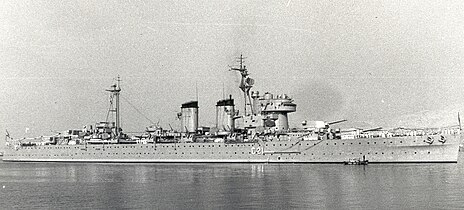Spain during World War II
During World War II, the Spanish State under Francisco Franco espoused neutrality as its official wartime policy. This neutrality wavered at times, and "strict neutrality" gave way to "non-belligerence" after the Fall of France in June 1940. Franco wrote to Adolf Hitler offering to join the war on 19 June 1940 in exchange for help building Spain's colonial empire.[1] Later in the same year Franco met with Hitler in Hendaye to discuss Spain's possible accession to the Axis Powers. The meeting went nowhere, but Franco did help the Axis—whose members Italy and Germany had supported him during the Spanish Civil War (1936–1939)—in various ways.
Despite ideological sympathy, Franco even stationed field armies in the Pyrenees to deter Axis occupation of the Iberian Peninsula. The Spanish policy frustrated Axis proposals that would have encouraged Franco to take British-controlled Gibraltar.[2] Much of the reason for Spanish reluctance to join the war was due to Spain's reliance on imports from the United States. Spain also was still recovering from its civil war, and Franco knew his armed forces would not be able to defend the Canary Islands and Spanish Morocco from a British attack.[3]
In 1941, Franco approved the recruitment of volunteers to Germany on the guarantee that they only fight against the Soviet Union and not against the western Allies. This resulted in the formation of the Blue Division which fought as part of the German army on the Eastern Front between 1941 and 1944.
Spanish policy returned to "strict neutrality" as the tide of war started to turn against the Axis. American pressure in 1944 for Spain to stop tungsten exports to Germany and to withdraw the Blue Division led to an oil embargo which forced Franco to yield. After the war, Spain was not allowed to join the newly created United Nations because of the wartime support for the Axis, and Spain was isolated by many other countries until the mid-1950s.
Domestic politics[edit]
During World War II, Spain was governed by an autocratic government,[4] but despite Franco's own pro-Axis leanings and debt of gratitude to Benito Mussolini and Adolf Hitler, the government was divided between Germanophiles and Anglophiles. When the war started, Anglophile Juan Beigbeder Atienza was minister of foreign affairs. German victories convinced Franco to replace him with Ramón Serrano Súñer, Franco's brother-in-law and a strong Germanophile (18 October 1940). After Allied victories in North Africa in summer 1942, Franco changed tack again, replacing Serrano Súñer with pro-British Francisco Gómez-Jordana Sousa in September. Another influential Anglophile was the Duke of Alba, Spain's ambassador in London.
Bribes by MI6[edit]
According to a 2008 book, Winston Churchill authorised millions of dollars in bribes to Spanish generals in an effort to influence General Franco against entering the war on the side of Germany.[38] In May 2013 files were released showing MI6 spent the present-day equivalent of more than $200 million bribing senior Spanish military officers, ship owners and other agents to keep Spain out of the war.[39]
Resources and trade[edit]
Despite lacking cash, oil and other supplies, Francoist Spain was able to supply some essential materials to Germany. There was a series of secret war-time trade agreements between the two countries. The principal resource was wolfram (or tungsten) ore from German-owned mines in Galicia, northwestern Spain. Tungsten was essential to Germany for its advanced precision engineering and therefore for armament production. Despite Allied attempts to buy all available supplies, which rocketed in price, and diplomatic efforts to influence Spain, supplies to Germany continued until August 1944.
Payment for wolfram was effectively set against the Spanish debt to Germany. Other minerals included iron ore, zinc, lead and mercury. Spain also acted as a conduit for goods from South America, for example, industrial diamonds and platinum. After the war, evidence was found of significant gold transactions between Germany and Spain, ceasing only in May 1945. It was believed that these were derived from Nazi looting of occupied lands, but attempts by the Allies to obtain control of the gold and return it were largely frustrated.


